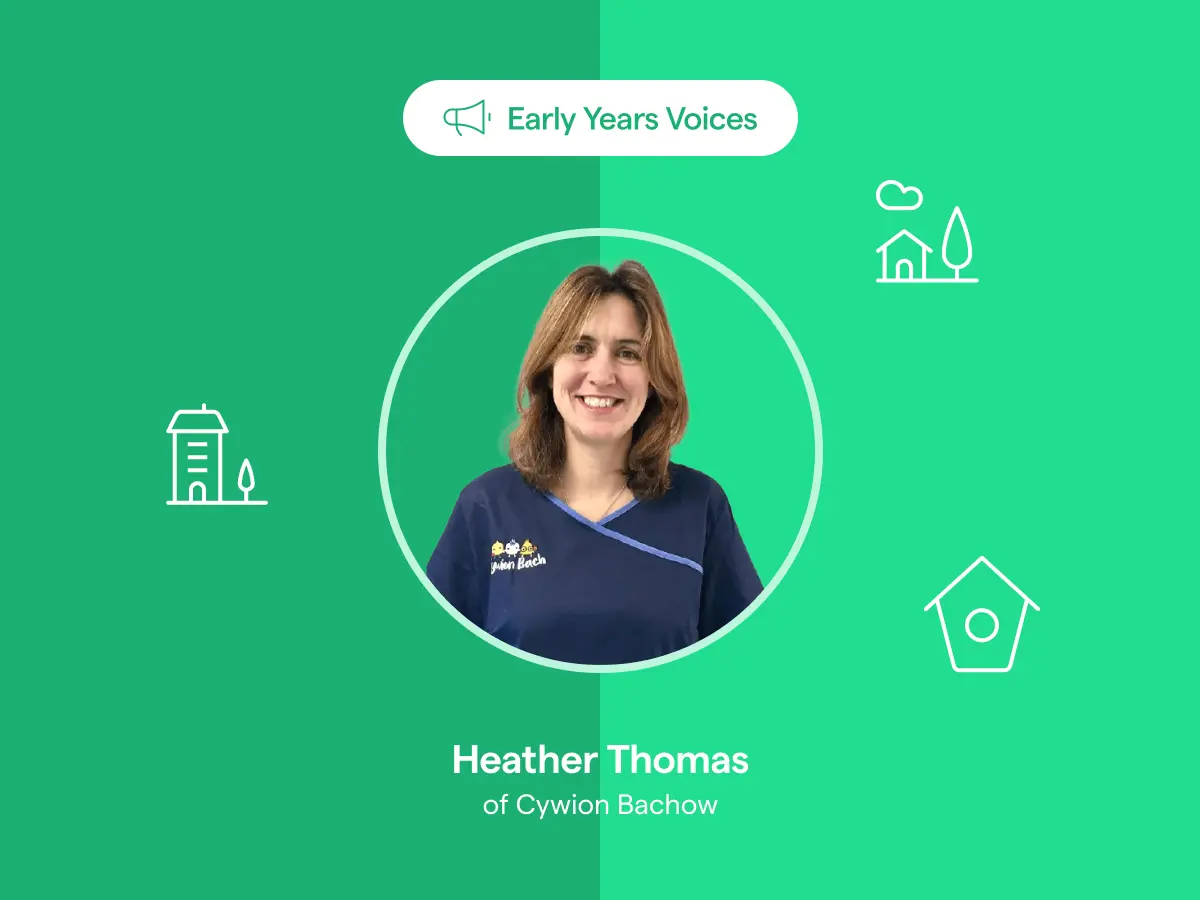Welsh-medium forest school
Idole, Camarthenshire
Childcare offer for Wales for 3 and 4 year olds
1
settings
110
children
With Famly since
March 2021
“Always blow on your marshmallow 10 times before you eat it.”
That’s just one of the fire pit rules that Heather Thomas shares with her forest school classes at Cywion Bach nursery in Carmarthen, West Wales.
Heather started out as a primary school teacher and is now the owner and manager of the exclusively Welsh-speaking setting Cywion Bach, as well as the resident forest school leader. She opened the setting in November 2018, having bought and renovated the then-derelict Edwardian schoolhouse in Idole, which Cywion Bach calls home.
Heather now shares her love of nature, forest school learning, and being out in the Carmarthenshire countryside with the 23 staff and 110 children Cywion Bach has on the register. She even got to share her passion with the rest of Wales when Awyr Iach (a Welsh children’s programme) came to film at the setting.
But if the thought of teaching your pre-schoolers around an open fire seems at best ambitious, and at worst terrifying, luckily Heather has lots more advice for you.
Gadewch i ni edrych!
(Let’s take a look!)
The big ideas
- Assess the risks…then take them
Teach children to manage themselves safely and assess risk as they go, as well as conducting your own risk assessments. - Reinforce the rules
Keep rules simple and repeat them each time you engage in a potentially risky activity. The more often you engage in risky play, the more opportunities you have to embed these rules. - Embrace the weather
Being outdoors isn't just for sunny days - just bring the right clothes for cold and wet weather. Different weather also changes the environment, creating new learning opportunities. - Love your location
Make the most of where you are. Heather believes in supporting children’s identity and belonging by embracing their local environment.
Assess the risks, then take them
When you begin doing forest school classes, or more risky play, ensure you undertake risk assessments to prevent unnecessary hazards. Heather explains that as a forest school leader she’s there to facilitate risk, but of course, to keep children safe.
“It’s about a balance,” she explains. “Children might fall or get a scratch, and small accidents happen, but have the risk assessments in place to prevent things becoming too dangerous.”
Acknowledging that small accidents might occur may be challenging to settings, especially when we know our paramount responsibility is to keep children safe.
“I can understand why some nurseries would feel anxious about allowing children to take these risks,” Heather says, “But the benefit really outweighs the potential risk of harm. And, life is risky, so you’ve got to introduce risks so children can learn to manage them.”
Reinforce the rules each time
If you’re thinking of introducing more risky play at your setting, Heather recommends coupling that with simple, clear rules to keep children safe.
When doing fire pit activities, for example, Heather and the Cywion Bach team remind the children of all the key rules every single time, such as:
- Always kneel at the fire.
- Don’t cross the fire circle.
- Don’t run near the fire.
- And of course, blow on your toasted marshmallow 10 times before you try it!
Heather explains that the temptation as a practitioner is just to say “Oh! Be careful!”, because we want to keep children safe, but that doesn’t tell children very much. The rules you set should be instructional, about specifically what children should be doing.
Heather also encourages doing these types of activities regularly, so children have frequent chances to learn and embed the ways to manage risk.

Embrace the weather
Being outdoors shouldn’t rely on sunshine. Heather recognises that after on-and-off lockdowns, being outdoors regardless of the weather is even more important.
“Getting outside makes you feel better,” she says, “Especially now with Covid, people’s mental health can suffer.”
So how do they manage this in West Wales where it rains an average of well over a metre of water a year? You just need the right clothes.
“I want everyone to love being outside, so when you come to Cwyion Bach, wellies and a rain suit are essential!” says Heather.
However, Heather explains that different weather isn’t just something to be mitigated with the right clothes, but is a great way to transform your outdoor classroom.
“The weather presents new variables and changes the environment, so there’s always new learning opportunities,” she says. “It might get slippery when it’s icy or muddy so there’s different risks and challenges. Children learn about different seasons in their environment.”
Love your location
Heather’s love of the outdoors and forest schooling is closely tied to the landscape around Cwyion Bach. Having grown up locally, within the community that Cwyion Bach serves, Heather recognises the importance of embracing your location as a tool to support belonging and identity, as well as just an outdoor resource.
“We’re a rural, farming community area, so the culture and identity is tied to the land,” she explains.
And that’s also partly why she chose to start an exclusively Welsh-speaking setting.
“In our area, Welsh is the predominantly spoken language. My first language is Welsh,” she says, “But Welsh is more than just a language, it’s a culture. Our rural communities, identities, and our language are closely linked. It’s a way of life and it's important that we pass it on.”
Feeling inspired?
The great news is you can embrace outdoor learning wherever you are. From the Carmarthen countryside to the centre of a city, getting outdoors provides children experiences and opportunities they just wouldn’t have inside your setting. Just remember your wellies!
Top tips from Alphabet House
Get top tips from a setting just like yours. Hear from Alphabet House on why and how they use Famly - and why they’ve never looked back.
Read their story










